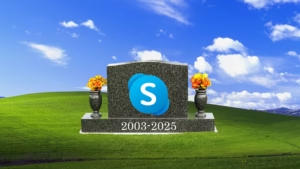Skype officially goes offline on May 5, 2025, marking the end of an era for one of the most influential platforms in internet history.
For over two decades, Skype was synonymous with internet-based communication. It pioneered free video calling, enabled long-distance families to stay connected, and even helped businesses collaborate across time zones long before remote work became the norm.
On May 5, 2025, Microsoft will officially shut down Skype, closing the chapter on a platform that shaped how the world talks. While the platform has faded in relevance over the last few years, its impact remains deeply woven into the fabric of the digital age.

1. The Rise of Skype: Disrupting Communication (2003–2011)
The Launch
- Founded in 2003 by Niklas Zennström and Janus Friis (also behind Kazaa)
- Introduced groundbreaking peer-to-peer (P2P) VoIP technology
- Allowed users to make free voice and video calls globally, long before WhatsApp or FaceTime
User Adoption
- Rapid growth: 50+ million users by 2007
- Became essential for:
- International families and relationships
- Startups and remote freelancers
- Gamers and podcasters

2. Microsoft’s Acquisition and Strategic Shift (2011–2025)
A $8.5 Billion Bet
- In 2011, Microsoft acquired Skype in a bold move to dominate digital communication
- Integrated Skype across:
- Windows OS
- Xbox consoles
- Office Suite (Outlook, Lync replacement)
Skype for Business vs Consumer Skype
- Skype for Business launched as an enterprise-grade tool
- Eventually merged and then replaced by Microsoft Teams (launched in 2017)
- Microsoft faced backlash over Skype’s bloated UI and overlapping tools
3. The Decline: How Skype Lost Its Edge
UX and Mobile Missteps
- Skype struggled with performance and mobile UX
- Confusing interface updates (e.g., Snapchat-like redesign in 2017)
- Poor integration of features like file sharing, scheduling, and real-time sync
Lost Market Share
- Competitors such as:
- Zoom – dominant during COVID-19
- Google Meet
- WhatsApp Video Calls
- FaceTime
- Skype missed the opportunity to lead during the 2020 remote work surge
4. Shutdown Announcement: The Final Call
Microsoft’s Message
- Skype officially decommissioned as of May 5, 2025
- Users advised to transition to Microsoft Teams
- Skype credits, chat history, and profile data scheduled for deletion/migration
Public Reaction
- Outpouring of nostalgia on Twitter, Reddit, and tech forums
- Tech journalists and long-time users posting farewell threads
- Memes celebrating “one last Skype call”
Skype is officially shutting down today.
— Haseeb Awan – efani.com (@haseeb) May 5, 2025
Hard to believe, considering it once owned the voice and video call space.
Before Zoom fatigue… before Slack channels… before Teams integrations… there was Skype.
It had:
– Over 300 million monthly users
– A global brand name as… pic.twitter.com/R0tnU8zLv8
The world if Microsoft decided to shut down Teams instead of Skype: pic.twitter.com/na8HtyiwKY
— Cliff Cornell (@cliffcornell_) May 5, 2025
Microsoft has officially shut down Skype
— Morning Brew ☕️ (@MorningBrew) May 5, 2025
The end of an era. pic.twitter.com/A9h5fGMSXB
Everyone, raise your lighter or phone flashlight for Skype today. We thank you for your service. pic.twitter.com/LBKAE8sxVf
— Stephen Kent (@StephenKentX) May 5, 2025
Goodbye Skype!
— Web Design Museum (@WebDesignMuseum) May 1, 2025
Microsoft is to permanently discontinue Skype in May 2025.
Skype GUI in 2003 ↘️ pic.twitter.com/Wz2MHZ3B4o
5. Skype’s Legacy: A Digital Pioneer
Technological Innovations
- P2P voice architecture
- First mainstream video calling app
- Allowed file sharing, messaging, and call recording well before competitors
Cultural Impact
- Used by U.N. officials, journalists, and celebrities
- Critical tool during global crises like:
- 2008 recession
- Arab Spring
- COVID-19 lockdowns

6. What Replaces Skype?
Microsoft Teams
- Teams becomes Microsoft’s flagship communication platform
- Features:
- Integrated with Office 365
- Secure enterprise controls
- Chat, video, file sharing, and whiteboards
Alternatives and Competitors
- Zoom: Remote work and virtual events
- Google Meet: Seamless for GSuite users
- Slack + Huddles: Team chat and calls
- WhatsApp / Telegram: Consumer-focused messaging
7. Lessons from Skype’s Rise and Fall
- Disruption ≠ Longevity
Even a market leader can fade without innovation and user trust. - Mobile-first, UX-first
Failure to adapt to changing user behavior (especially on mobile) hurt adoption. - Cannibalization Risks
Skype and Teams competing internally diluted Microsoft’s messaging strategy.
Farewell, Skype
Skype wasn’t just an app—it was a movement that democratized communication across the globe. It connected millions, broke distance barriers, and gave rise to a new way of working, loving, learning, and collaborating.
As we say goodbye, we celebrate what Skype made possible and acknowledge the ever-changing landscape of technology that demands constant evolution.
Thanks for the calls, Skype. You won’t be forgotten.






